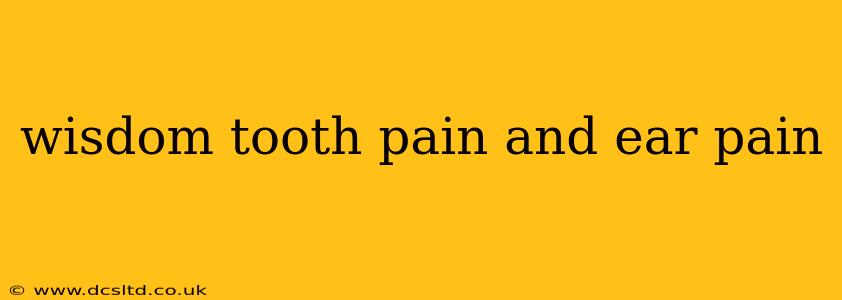Experiencing pain in your wisdom teeth and ear simultaneously can be incredibly uncomfortable and confusing. The proximity of your wisdom teeth to your ears, along with the intricate network of nerves in your jaw, often leads to referred pain. This means pain originating in one area, like your wisdom teeth, can be felt in another, like your ear. Let's delve into the reasons why you might experience this dual pain and what you can do about it.
Why Do Wisdom Teeth Cause Earache?
The connection between wisdom tooth pain and earache is primarily due to the intricate network of nerves in your head and jaw. The trigeminal nerve, a major cranial nerve, innervates both your teeth and your ear. Inflammation or infection around an impacted or erupting wisdom tooth can irritate this nerve, causing referred pain in your ear.
This referred pain can manifest in various ways, from a dull ache to sharp, stabbing sensations. The intensity and type of pain can vary depending on the severity of the wisdom tooth issue.
What are the Specific Causes?
-
Impacted Wisdom Teeth: Wisdom teeth that are unable to fully erupt can become impacted, causing inflammation and pressure on surrounding tissues and nerves. This pressure can easily lead to referred ear pain.
-
Infected Wisdom Teeth (Pericoronitis): Infection around a partially erupted wisdom tooth (pericoronitis) is a common cause of both tooth and ear pain. The infection can spread, further irritating the trigeminal nerve and causing significant discomfort.
-
Dental Abscess: A collection of pus near the root of the tooth, often caused by infection, can put immense pressure on surrounding nerves leading to both tooth pain and earache.
-
Sinusitis: While not directly related to wisdom teeth, sinus infections can sometimes cause referred pain in the jaw and ear, potentially overlapping with symptoms of wisdom tooth problems. It's crucial to get a proper diagnosis to rule out other causes.
How Can I Tell if My Ear Pain is Related to My Wisdom Teeth?
Differentiating between ear infections and wisdom tooth-related ear pain requires careful consideration of your symptoms. While both can cause earache, wisdom tooth pain often presents alongside:
- Swelling in the jaw: Noticeable swelling around the wisdom tooth area.
- Jaw stiffness or difficulty opening your mouth: Makes chewing and talking painful.
- Bad taste or bad breath: Signs of infection around the tooth.
- Pain that worsens when chewing or biting: Pinpointing the location to near the wisdom tooth.
What Should I Do If I'm Experiencing Both Wisdom Tooth Pain and Ear Pain?
If you are suffering from both wisdom tooth pain and ear pain, it's essential to seek professional dental care immediately. Delaying treatment can lead to more serious complications, such as a severe infection spreading beyond the jaw.
Your dentist will be able to diagnose the underlying cause of your pain and recommend the appropriate treatment. This may include:
- Antibiotics: To combat infection if present.
- Pain medication: To manage pain and inflammation.
- Extraction of the wisdom tooth (or teeth): If necessary, to alleviate pressure and infection.
Can Ear Pain from Wisdom Teeth Go Away on its Own?
While some minor discomfort might subside, severe pain associated with impacted or infected wisdom teeth is unlikely to resolve without professional intervention. Ignoring the problem can lead to more significant complications, including severe infections, jaw swelling, and even the need for more complex and potentially painful procedures later on. Early treatment is always the best approach.
Will Removing My Wisdom Teeth Solve the Ear Pain?
In most cases, removing the affected wisdom tooth will resolve the ear pain. The removal eliminates the source of inflammation and pressure on the trigeminal nerve, alleviating the referred pain. However, it's crucial to remember that your dentist will make this determination after a thorough examination.
This information is intended for general knowledge and informational purposes only, and does not constitute medical advice. It is essential to consult with a qualified healthcare professional for any health concerns or before making any decisions related to your health or treatment.
